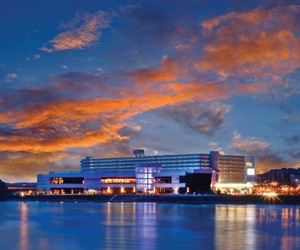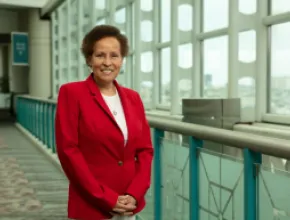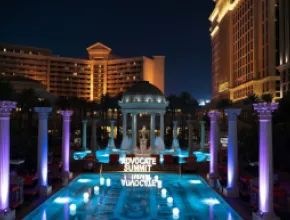In the East, the gaming destination landscape continues to expand as states up the ante, piling on new action-packed meeting and entertainment options.
Maryland’s first two casinos have opened and another is under construction. Four casinos are being built in Ohio, with the state’s first slated to open next March.
A move is under way by New York lawmakers to allow Vegas-style table games such as poker, blackjack and roulette at its racetrack casinos (racinos). All Pennsylvania and Delaware casinos installed table games in the summer of last year following enabling legislation.
This November, Maine’s voters will be asked to approve additional casinos and, after several failed attempts in recent years, Massachusetts could see gaming legalized before year’s end.
Just five years ago the Keystone State had not one casino; the first was preparing to open. Now it has 10, and almost as many slot machines as Atlantic City, the nation’s second-largest commercial casino market after Las Vegas.
Atlantic City
Casino expansion in surrounding states and a disappointing economy have continued to play havoc with Atlantic City’s gaming and its 11 casino resorts. Gaming revenue has been slipping again, but the city that is “Always Turned On” is moving on, evolving with an added focus on meetings and conventions.
“Our group business production is up double digits. Properties are focusing on this business,” says Gary Musich, vice president, convention sales for the Atlantic City CVA. “New investment is coming back and we continue to improve the product. The future looks good. There’s a lot of added competition in gaming and we’ve suffered the lows, but we’ve been slowly coming back.”
According to Musich, meetings and conventions hotel room nights for the first eight months of this year were up 27 percent, and meetings attendance was up 51 percent.
The area around the Atlantic City Convention Center is increasing its appeal. Acquired in 2010 by Tanger, The Walk outlets expanded early this year, adding a 20-store phase III. And before year’s end, a new 1,182-space parking garage and retail project serving the outlets, Boardwalk Hall and the convention center will debut. A new special events center, One Atlantic, opened early last year atop the Pier at Caesars with 12,300 square feet of meeting space.
The big news came in May in the form of an opening date for the long-delayed, $2.4 billion Revel. It debuts May 15, 2012. With additional financing work resumed on the 1,100-room resort, which will include a casino, restaurants, three clubs, a spa, two theaters and a 30,000-square-foot meeting center.
The former Trump Marina Casino Hotel is now the Golden Nugget Atlantic City. Under new owners, Houston-based Landry’s Inc., it will complete a $150 million renovation and rebranding late this year.
Also under new ownership is Resorts Casino Hotel, the city’s first casino resort, opened in 1978. In May it rolled out a new theme embracing the Roaring ’20s, building on the Boardwalk Empire, the HBO series about prohibition-era AC.
The Borgata Hotel Casino & Spa, now eight years old and the last new casino hotel, has a $50 million renovation of its 1,971 rooms under way, slated for a late 2012 completion.
New casinos had to have a minimum of 500 hotel rooms. New legislation passed in January allows for two smaller casinos, with a minimum of 200. Hard Rock International, the only applicant by an August deadline, plans to open a casino in 2014 initially with 200 rooms, and increasing to 850.
Pennsylvania
Keystone State gaming revenues continue to grow; for the year ended June 30, tax revenue from its slot machines increased 7.8 percent over the previous 12 months.
Legislation passed early last year approved table games and in July 2010 all 10 casinos had installed them. Each had between 40 and 150 tables.
The first casino, Mohegan Sun at Pocono Downs in Wilkes-Barre, opened almost five years ago, in November 2006.
The newest gaming facility, the 1,600-slot SugarHouse Casino, opened in Philadelphia along the Delaware River in September last year, and has plans to begin a casino expansion next summer. On Pittsburgh’s waterfront, the 3,000-slot Rivers Casino, which includes a 1,000-seat outdoor amphitheater, opened in August 2009.
In the Lehigh Valley, the Sands Casino Resort Bethlehem unveiled a 302-room hotel with 8,000 square feet of meeting space over Memorial Day weekend. The 3,000-slot casino opened on the Bethlehem Steel site in May 2009. Dining outlets include three different Emeril Lagasse restaurants.
The Shoppes at Sands, a 30-store outlet mall, begins opening Nov. 1, and a multipurpose 50,000-square-foot event center is scheduled to open in May 2012.
“Since the hotel opened we have seen a very strong demand for rooms, and that demand has not slowed. We continue to have high occupancy both during the week and on weekends,” says Robert DeSalvio, Sands Casino Resort president, adding that the event center will mean more entertainment and meeting options for the region.
It is the state’s second casino resort. The first, the Poconos’ 188-room Mount Airy Casino, opened in 2007, and has 7,200 square feet of meeting space and an 18-hole golf course.
Six of the state’s 10 casinos are at racetracks (category 1); and four are standalone casinos (category 2). Each is allowed up to 5,000 slots and 250 table games. The state has issued 14 licenses, and four casinos have yet to be built.
The six racinos all now have permanent facilities, the last to debut being the $250 million Parx Racing & Casino (formerly Philadelphia Park Racetrack) in December 2009. Yet to be built is Valley View Downs, a Lawrence County harness track and casino that recently reportedly obtained $150 million in financing.
A license for a Foxwoods Casino in Philadelphia, which was subject to delays, was revoked in December and is in litigation.
Also yet to open are two smaller category 3 casinos at existing resorts with up to 600 slots and 50 table games. Licenses were awarded to the Valley Forge Convention Center in King of Prussia and Nemacolin Woodlands Resort in Farmington. Both plan to open with the maximum number of slots and table games.
Under construction at the convention center, which has more than 100,000 square feet of available space, and 488 rooms in two hotels, is the Valley Forge Casino Resort, set to open next spring. The license was awarded in 2009, but a legal challenge delayed construction.
In April, Pennsylvania awarded Nemacolin and Isle of Capri Casinos the last license, but a competitor has appealed. A $50 million Isle Lucky Lady-brand casino is expected to open nine months after a favorable decision.
New York
The Empire State has eight racinos. According to the American Gaming Association (AGA). They experienced a 6.9 percent increase in gaming revenues last year over 2009. The state also has a handful of Class III Native American casinos.
In September, the state Senate held its first hearing on a constitutional amendment that would allow table games at the racetracks, which only the Native American casinos can currently offer. Gov. Andrew Cuomo plans to have a position on the issue by January.
In 2001, the state established a goal of having eight racetrack casinos. The first opened in 2004. Later it added a ninth to the list, the Aqueduct Racetrack in Queens, which is about to open.
The Resorts World New York Casino opens at Aqueduct in late October. Operator Genting New York, a subsidiary of Genting Malaysia, expects to have about half the almost 5,000 VLTs (video lottery terminals) operating on opening, with the rest installed by year’s end. The casino will have 230,000 square feet of event/exhibition space.
The 5,310-slot Empire City Casino at Yonkers Raceway, which can host 500 for events, is expanding. In July, it broke ground on a $40 million project that includes a redesigned and expanded casino floor, slated for an early 2012 completion.
The last new racino to open was the $25 million Hamburg Casino at Erie County Fairgrounds/Buffalo Raceway in August last year.
In May, Concord Associates and the Mohegan Tribal Gaming Authority (MTGA) announced they had partnered to develop the $600 million Mohegan Sun Concord in Thompson in the Catskills’ Sullivan County. It would include harness racing and a 258-room hotel on the site of the historic Concord Hotel, which was demolished in 2008.
Four miles from the hotel site is Empire Resorts’ Monticello Casino & Raceway, a harness track and casino. In partnership with Entertainment Properties Trust, Empire has been planning a project that would also include a harness track and hotel on Concord land. It stated it would oppose any request to obtain licenses for the MTGA project’s track or VLTs.
The Seneca Nation operates three casinos. It has the 604-room Seneca Niagara Casino & Hotel in Niagara Falls, which has 30,000 square feet of meeting space and where a $10.4 million room renovation is expected to be completed in January. The tribe unveiled a nearby Robert Trent Jones II-designed 18-hole course in July last year. Across in Niagara, Ontario, competition comes from the 368-room Fallsview Casino Resort with 50,000 square feet of meeting space.
In August, the Seneca announced a 200-room expansion at the 212-room Seneca Allegany Casino & Hotel in Salamanca, which has a 2,000-seat event center. It has also been studying design proposals for a new and permanent Seneca Buffalo Creek Casino in downtown Buffalo, which opened a $9 million casino expansion in March last year.
Near Syracuse, the Oneida Nation operates the Turning Stone Resort & Casino with 700 rooms, 100,000 square feet of meeting space and three golf courses. In January last year, the St. Regis Mohawk Tribe’s 1,600-slot Akwesasne Mohawk Casino in Hogansburg near the Canadian border completed a $55 million dining and casino expansion.
New England
In Massachusetts, a casino bill passed 123-32 the state House and was heading to the Senate at press time. Supported by Gov. Deval Patrick, it would allow for three resort-style casinos and one racetrack casino.
With just two Native American casinos, Connecticut provides the country’s fourth-largest casino market after Las Vegas, Atlantic City and Chicago. The 2,200-room Foxwoods and 1,000-room Mohegan Sun together boast more than 12,800 slots and 700 table games.
Foxwoods Resort Casino and the MGM Grand at Foxwoods, which debuted in May 2008, together have 160,000 square feet of meeting space and a 4,000-seat theater. Mohegan Sun has 100,000 square feet of meeting space.
Rhode Island has two casinos: Twin River in Lincoln with 4,750 VLTs and a 29,000-square-foot event center, and the 1,000-slot Newport Grand Slots. Its gaming revenues increased 3.4 percent last year over 2009, according to AGA.
Lawmakers approved a referendum on a Twin River bid to add table games.
Maine’s casino revenue increased by 4.2 percent last year. It has one casino: the 151-room Hollywood Slots, Hotel & Raceway in Bangor, which offers meeting space. This November, voters will be asked to approve three additional casinos.
Delaware/Maryland
After legislature approval, table games were installed at Delaware’s three racetrack casinos in early summer last year. The state’s gaming revenues increased 1.3 percent in 2010.
The 500-room Dover Downs Hotel & Casino, the state’s largest hotel, offers 35,000 square feet of meeting space; Harrington Raceway & Casino offers group space for 400; and Delaware Park in Wilmington boasts an 18-hole golf course.
Maryland now has two casinos and another under construction.
Voters in November 2008 approved a constitutional amendment allowing five casinos with a total of 15,000 slots at five locations: Baltimore, Anne Arundel, Cecil, Worcester and Allegany counties.
The first casino unveiled was Penn National Gaming’s $97.5 million, 1,500-slot Hollywood Casino Perryville near Baltimore in Cecil County in September last year. Last January, just outside Ocean City in Worcester County, the $45 million, 700-slot Casino at Ocean Downs, which has harness racing, opened.
Also in January, the Cordish Company broke ground south of Baltimore on the Maryland Live! Casino at Arundel Mills, which has more than 200 stores. Expected to open next summer, it will have 4,750 slots, electric table games and five restaurants and entertainment venues.
Ohio
Buckeye State voters approved a constitutional amendment in November 2009 allowing one casino in each of its four largest cities, each with up to up to 5,000 slots and table games. This past summer lawmakers also passed a bill backed by Ohio Gov. John Kasich allowing racinos at the state’s seven racetracks. Disputes over taxes and fees were also settled.
The casino developers are Rock Ohio Caesars, a joint venture of Caesars Entertainment Corp. and Rock Gaming, that will result in Horseshoe-brand casinos in Cleveland and Cincinnati; and Penn National Gaming, with Hollywood casinos in Toledo and Columbus.
The $350 million, 2,100-slot Horseshoe Casino Cleveland is expected to debut next March downtown inside the Higbee building,
Groundbreaking was held in February for the $400 million, 2,000-slot Horseshoe Casino Cincinnati. Expected to open in 2013, the downtown facility will offer 33,000 square foot of multipurpose function space.
Slated to debut during the first half of 2012 is the $300 million, 2,000-slot Hollywood Casino Toledo on a Maumee River site opposite downtown Toledo; and in the fourth quarter, the $400 million 4,000-slot Hollywood Casino Columbus.
Tony Bartlett has covered the hospitality industry for more than 20 years.






